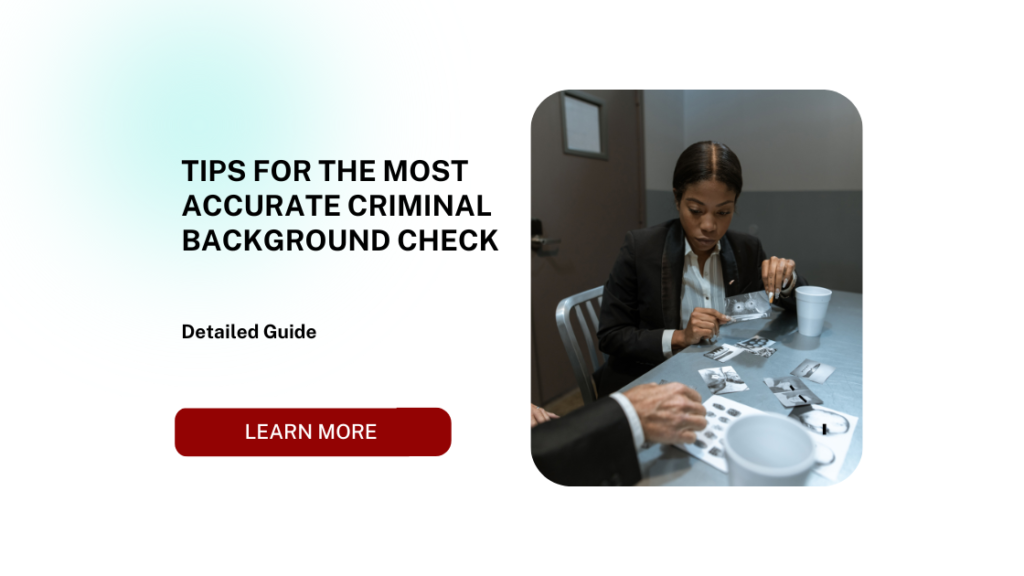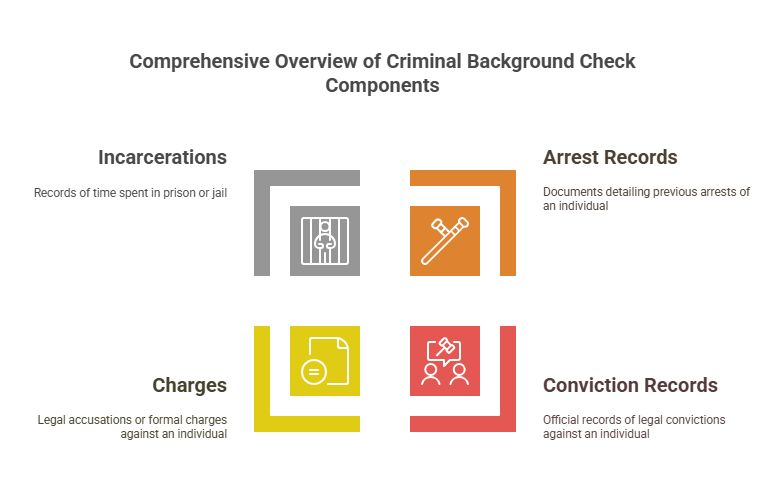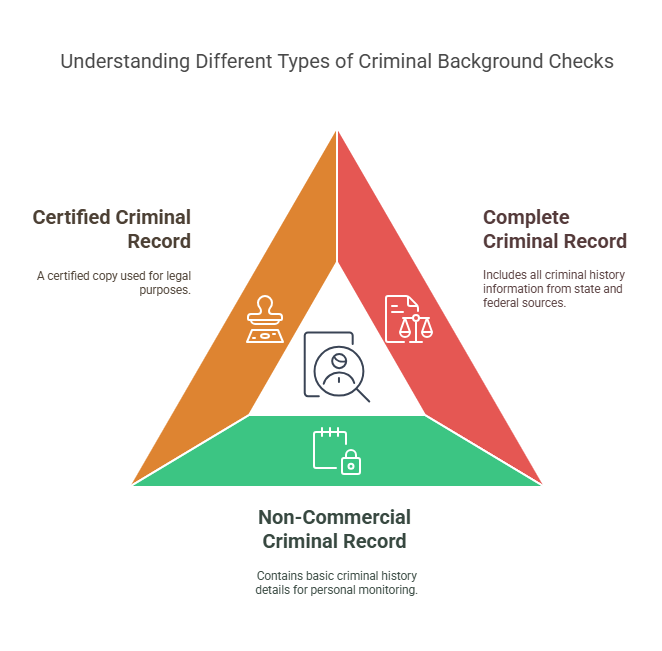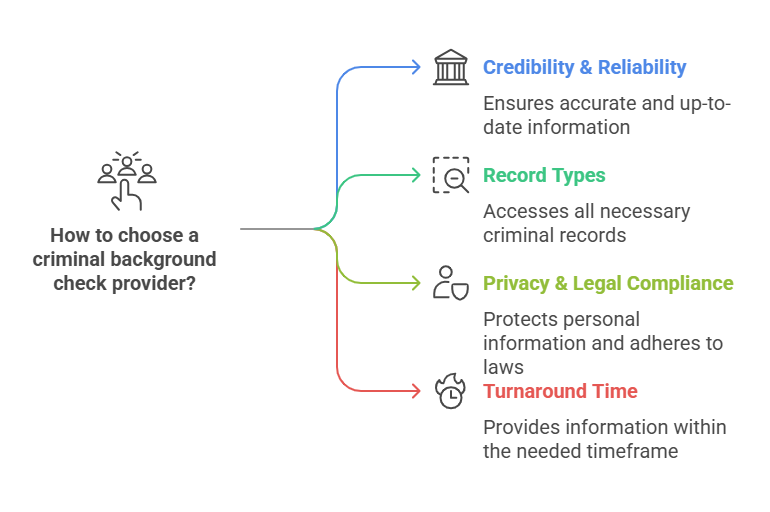Tips for the Most Accurate Criminal Background Check

Most Accurate Criminal Background Check: Everything You Need to Know
Criminal background checks have become an essential part of our personal and professional lives. They are used to verify a person’s criminal history for various purposes, such as employment, housing, legal matters, and more. But what exactly makes a criminal background check accurate, and why is accuracy so crucial? In this section, we will introduce criminal background checks, explain their significance, and explore the factors that contribute to their accuracy.
Introduction to Criminal Background Checks

A criminal background check is a process used to investigate an individual’s history in terms of any criminal activities they may have been involved in. This check typically includes any records of arrests, convictions, charges, or incarcerations and is most commonly used for:
- Employment screening: Employers use background checks to evaluate potential employees, especially for roles where trust, safety, or security is important.
- Tenant screening: Landlords check the criminal history of prospective tenants to ensure the safety of their properties and other tenants.
- Pre-employment background checks: Certain industries, such as finance, healthcare, or government sectors, often require thorough background checks as part of their hiring process.
- Legal purposes: Background checks are also used in legal situations such as parole hearings, probation conditions, and family court cases.
Given the importance of criminal background checks, it’s critical that the information retrieved is both accurate and up-to-date. Inaccurate criminal background checks can lead to wrongful employment decisions, housing denials, or legal complications, making it essential to understand what influences the accuracy of these checks.
What Constitutes an Accurate Criminal Background Check?
An accurate criminal background check is one that thoroughly and correctly reflects the criminal history of an individual. It should include all relevant data and be free of errors. When background checks are inaccurate, they can cause harm to the individual being checked or to those using the information to make decisions.
The accuracy of a criminal background check depends on several key factors. These include the source of the information, the completeness of the records, the timeliness of the data, and the presence of human error. Below, we will discuss these factors in greater detail.
Key Factors Affecting Accuracy
Understanding the factors that influence the accuracy of criminal background checks can help individuals and organizations ensure they are obtaining reliable information.
1. Source of Information
The accuracy of a criminal background check is heavily influenced by the source from which the information is obtained. There are two primary sources of criminal record data:
- Government Databases: These include state and federal government-run databases that provide access to criminal records. These databases are often the most reliable and official sources of information. For example, the FBI provides national background checks, and state police departments offer state-specific criminal records.
- Third-Party Providers: These private companies collect criminal records from various public sources, including court documents, police reports, and correctional facilities. While third-party providers can offer convenience and speed, their accuracy depends on the quality of the data they collect and whether they update their records regularly.
Government databases are typically more accurate because they rely on official, government-maintained records. However, third-party services often aggregate data from multiple sources, offering more comprehensive records. Understanding these sources is important for evaluating the credibility of the results.
2. State and Federal Records
Criminal records are maintained at both the state and federal levels. State records usually include offenses committed within a specific state, while federal records include violations of federal law. The combination of these records provides a complete view of an individual’s criminal history.
- State Databases: These are maintained by state law enforcement agencies and contain records related to crimes committed within the state. Each state has its own regulations regarding the release of criminal records.
- Federal Databases: The FBI maintains federal criminal records that include offenses that violate federal laws, such as interstate drug trafficking or federal fraud.
State and federal records may differ, and there can be gaps in a criminal background check if only one source is used. Therefore, it’s crucial to perform both state and national checks to ensure the information is complete and accurate.
3. Database Quality
The quality of the database used to perform the criminal background check significantly impacts its accuracy. Well-maintained databases are regularly updated and corrected, ensuring that the criminal records contained within them are current and complete. On the other hand, poor data management practices, such as failure to update records promptly or incorrect data entry, can result in inaccurate or outdated information being included in the background check.
For example, a criminal conviction that was recently expunged might still appear in a poorly managed database, leading to inaccurate conclusions about an individual’s criminal history. Therefore, the quality control procedures in place to ensure data accuracy should be a priority when choosing a provider.
4. Timeliness of Data
Timely data is critical when it comes to criminal background checks. Criminal records are often updated after certain events occur, such as arrests, convictions, or the completion of a sentence. If a background check is based on outdated information, it could lead to incorrect conclusions or missed events.
For example, if a person was recently arrested but the record was not yet updated in the database, a background check would fail to include that information. To ensure the most accurate criminal background check, it’s important to obtain data from sources that regularly update their records and maintain real-time accuracy.
5. Human Errors
Human error is another key factor that can affect the accuracy of criminal background checks. Criminal records are typically entered into databases by law enforcement personnel, clerks, or other government employees. Mistakes in data entry, such as misspelling a name or incorrectly entering a birthdate, can result in incorrect information being recorded.
Additionally, if criminal charges are not properly processed or if court records are misfiled, these errors can lead to missing or inaccurate records in a background check. While it’s not possible to eliminate human error entirely, choosing reputable providers with accurate data management practices can help minimize the likelihood of such mistakes.
Types of Criminal Background Checks Available
When you decide to conduct a criminal background check, it’s important to know the types of records available and what each type includes. The three main types of criminal background checks in Texas are:

- Type 1: Complete Criminal Record: This type includes all available criminal history information from both state and federal sources, as well as any arrests, convictions, and sentences. It provides a comprehensive overview of an individual’s criminal history.
- Type 2: Non-Commercial Criminal Record: This record includes only basic criminal history details, such as arrests or convictions within the state. It is often used for personal monitoring purposes and may not be as detailed as the complete record.
- Type 3: Certified Criminal Record: This record is a certified copy of an individual’s criminal history, issued directly by the Texas Department of Public Safety (DPS). It is often used for legal purposes, such as court proceedings or employment applications where proof of criminal history is required.
Step-by-Step Guide to Getting the Most Accurate Criminal Background Check
There are several ways to obtain a criminal background check, including through official government channels, third-party services, and manual records checks. Each method offers a different level of convenience, cost, and accuracy. Below, we’ll walk through each option to help you choose the best route for obtaining the most accurate results.
1. Online Request through Official Government Channels
The most reliable and accurate method to obtain a criminal background check is through official government sources. Both state and federal government agencies maintain criminal records databases that can be accessed online.
How to Request a Background Check from the FBI
The FBI offers national criminal background checks that provide information on federal offenses, including interstate crimes. The process involves submitting fingerprints and a request form through the FBI’s Identity History Summary Checks website.
Steps for requesting an FBI background check:
- Visit the FBI’s website: Go to the FBI’s Identity History Summary Checks page.
- Complete the form: Fill out the online request form, providing all required personal information.
- Submit fingerprints: You will need to submit your fingerprints through a local law enforcement agency or via electronic fingerprinting services.
- Payment: Pay the associated fee (typically around $18 for a standard check).
- Receive results: After processing (usually 1–3 weeks), the FBI will send you the results of your criminal background check.
While the FBI offers the most comprehensive criminal history check, it’s important to note that this service primarily covers federal crimes. If you need a broader history that includes state-level crimes, it’s essential to request state-specific records as well.
How to Request a Criminal Background Check from Your State
Each state in the U.S. also has its own process for conducting criminal background checks. These checks are typically offered through the state police or the state department of public safety (DPS).
For example, in Texas, you can request a criminal background check from the Texas DPS, which will provide information on state offenses. Here’s how to get a Texas criminal background check:
- Visit the Texas Department of Public Safety (DPS) website.
- Create an account or log in if you already have one.
- Request a background check by providing personal information, such as your name and date of birth.
- Pay the fee (typically around $25 for a standard criminal history check).
- Receive results: You’ll receive a detailed report of your criminal history within minutes if you request it online, or a few days by mail.
State-level checks provide information about crimes committed within the state, and the results are more accurate for local offenses.
2. Third-Party Background Check Services
Third-party background check providers are popular for their convenience, speed, and thoroughness. They gather criminal history data from a variety of public sources, including state and federal databases, court records, and correctional facilities.
Exact Background Checks: A Trusted Third-Party Service
Exact Background Checks is a great example of a third-party provider that ensures accurate and comprehensive criminal background checks. This service has access to numerous public databases, including local, state, and national criminal records. The advantage of using a third-party service like Exact Background Checks is that they aggregate information from multiple sources, providing a more complete picture of an individual’s criminal history.
Benefits of using a third-party service like Exact Background Checks include:
- Thoroughness: They search multiple databases to ensure all criminal records are included.
- Accuracy: Reputable third-party providers work with official records and verify the data.
- Speed: Third-party services can deliver results faster than government agencies in some cases.
- Comprehensive reports: In addition to criminal history, third-party services often offer reports that include employment history, education verification, and more.
Steps for using a third-party provider:
- Choose a reputable service: Research and select a third-party provider that offers accurate and reliable criminal background checks.
- Submit information: Provide the required personal information, such as your full name, date of birth, and possibly your social security number.
- Review results: After processing (typically within 24–48 hours), you will receive your criminal background check, which may include reports on arrests, convictions, and sentences.
While third-party services like Exact Background Checks can be more expensive than government checks, they are often a faster and more convenient option for those who need comprehensive information quickly.
3. Manual Record Checking
In some cases, you may need to manually request a criminal background check by visiting local law enforcement agencies or courthouses. This option may be necessary if you are looking for specific records that are not readily available through online services.
Steps for manual record checking:
- Contact local law enforcement: Visit or contact your local police department, sheriff’s office, or courthouse to inquire about the process for obtaining criminal records.
- Provide identification: Be prepared to present identification to verify your identity.
- Complete the forms: Fill out any required forms and pay any necessary fees.
- Review results: After processing, you will be provided with a physical or digital copy of your criminal history.
While this method ensures that you receive official records from local sources, it may be time-consuming and may not offer access to broader state or national data.
Factors to Consider When Choosing a Criminal Background Check Provider
When selecting a criminal background check provider, whether government-run or a third-party service, there are several key factors to consider to ensure that you are getting the most accurate and reliable results.

1. Credibility and Reliability
It’s crucial to choose a provider with a strong reputation for providing accurate, up-to-date information. Government agencies are generally the most reliable sources, as they are responsible for maintaining and updating criminal records. However, reputable third-party providers can also offer reliable results if they source information from official channels.
2. Types of Records Searched
Different providers may offer varying levels of access to criminal records. Some only search state-level records, while others access federal or local databases as well. Make sure that the provider you choose includes all relevant types of records for your needs.
3. Privacy and Legal Compliance
It is essential that the provider complies with privacy laws, such as the Fair Credit Reporting Act (FCRA). This ensures that the criminal background check is conducted legally and that your personal information is protected.
4. Turnaround Time
The time it takes to receive your criminal background check can vary. Government-run agencies may take several days or weeks to process requests, while third-party providers typically offer faster turnaround (often within 1–3 business days). If you need the information urgently, you may want to opt for a third-party service.
Comparing Providers: Government Services vs. Third-Party Providers
To help you better understand the differences between government-run background checks and third-party providers, we’ve created the following table:
| Provider | Accuracy | Speed | Cost | Types of Records |
|---|---|---|---|---|
| Government (State/FBI) | High | Slow (1–3 weeks) | $15–$30 | Local, state, federal offenses |
| Exact Background Checks | Very High | Fast (1–3 days) | $30–$75+ | Local, state, federal, more details |
Legal Aspects of Criminal Background Checks
Understanding the legal framework surrounding criminal background checks is essential, both for individuals undergoing checks and for employers or organizations conducting them. Inaccurate background checks can have serious consequences for all parties involved. Let’s explore the most important legal aspects.
1. Rights of Individuals and Legal Protections
In the U.S., individuals have the right to access and challenge any criminal records held by government agencies. This includes the right to dispute errors on background checks and the opportunity to ensure that the information is accurate and up to date. The Fair Credit Reporting Act (FCRA) is a crucial law that regulates how background checks can be conducted and how the information can be used.
The FCRA mandates that any background check used for employment or housing decisions must be accurate, current, and complete. If an employer uses an inaccurate background check to deny a job application, for example, the individual may have legal grounds for a lawsuit.
2. Privacy Laws and Compliance
Criminal background checks are governed by privacy laws that ensure an individual’s personal information is protected. These include:
- The FCRA: This law governs how information in a background check report can be collected, used, and shared. It ensures individuals are informed if a background check is used in decisions regarding employment or housing.
- State-Specific Laws: States may also have specific laws about how criminal records are handled. For example, some states may have expungement laws that allow individuals to clear certain criminal records after a period of time.
- The Privacy Act: This law governs the collection, use, and sharing of information about individuals in the federal records system.
For employers, it is important to comply with these laws when conducting criminal background checks to avoid potential lawsuits or legal penalties.
3. Legal Consequences of Inaccurate Criminal Background Checks
Inaccurate or incomplete criminal background checks can lead to wrongful decisions such as denying someone a job, housing, or other opportunities. For example:
- Employment Issues: An employer who relies on inaccurate criminal history data may inadvertently reject a qualified candidate. If this happens, the individual has the right to challenge the accuracy of the report and request a correction.
- Housing Issues: Landlords and property managers who perform background checks on potential tenants must ensure that the information they rely on is accurate. Discriminating against someone based on incorrect criminal history can lead to legal repercussions.
- Court Cases and Legal Proceedings: In legal matters such as probation, parole, or custody battles, inaccurate background checks could lead to unfair decisions or prevent an individual from obtaining the relief they deserve. It’s important to verify the criminal record information thoroughly.
Frequently Asked Questions (FAQs) About Criminal Background Checks
To further help you understand the intricacies of criminal background checks, let’s address some commonly asked questions.
What makes a criminal background check accurate?
An accurate background check thoroughly and correctly reflects an individual's criminal history, using reliable sources like government databases, and ensures the data is up-to-date and free of human errors.
What are the main sources of information for criminal background checks?
The main sources are government databases (state and federal) and third-party providers that aggregate data from various public records.
What are the different ways to obtain a criminal background check?
You can obtain a background check through online requests from official government channels (like the FBI or state DPS), using third-party background check services, or by manually checking records at local law enforcement agencies or courthouses.
What legal protections are in place for individuals undergoing criminal background checks?
Legal protections include the Fair Credit Reporting Act (FCRA), which mandates that background checks used for employment or housing decisions must be accurate, current, and complete, and various privacy laws that protect personal information.
Why is it important to choose a reputable criminal background check provider?
Choosing a reputable provider ensures accuracy, reliability, and legal compliance. Reputable providers use official records, update their databases regularly, and adhere to privacy laws, minimizing the risk of errors and legal issues.
What makes a criminal background check accurate?
An accurate background check thoroughly and correctly reflects an individual's criminal history, using reliable sources like government databases, and ensures the data is up-to-date and free of human errors.
What are the main sources of information for criminal background checks?
The main sources are government databases (state and federal) and third-party providers that aggregate data from various public records.
What are the different ways to obtain a criminal background check?
You can obtain a background check through online requests from official government channels (like the FBI or state DPS), using third-party background check services, or by manually checking records at local law enforcement agencies or courthouses.
What legal protections are in place for individuals undergoing criminal background checks?
Legal protections include the Fair Credit Reporting Act (FCRA), which mandates that background checks used for employment or housing decisions must be accurate, current, and complete, and various privacy laws that protect personal information.
Why is it important to choose a reputable criminal background check provider?
Choosing a reputable provider ensures accuracy, reliability, and legal compliance. Reputable providers use official records, update their databases regularly, and adhere to privacy laws, minimizing the risk of errors and legal issues.
Conclusion
In this final part of the article, we explored the legal implications, frequently asked questions, and provided important context for understanding how to obtain the most accurate criminal background check.
Key Takeaways:
- Accuracy is critical when conducting criminal background checks, as inaccurate information can lead to wrongful decisions.
- Legal protections such as the Fair Credit Reporting Act (FCRA) ensure that background checks are accurate and that individuals can dispute errors.
- Always choose a reliable provider, whether you opt for government-run services or third-party providers like Exact Background Checks, to ensure accuracy and completeness.
- Background checks should comply with privacy laws and respect individuals’ rights to protect their information and prevent discrimination.
- Errors in background checks can have severe consequences, and individuals have the right to challenge incorrect records.
For the most accurate and legally compliant criminal background checks, rely on trusted services such as Exact Background Checks, which offer thorough, up-to-date reports sourced from multiple databases. Whether you’re an employer, landlord, or someone undergoing a background check for personal purposes, it’s essential to verify that the data you receive is accurate to make informed decisions.
By following the steps outlined in this guide, you can ensure that the criminal background checks you conduct are reliable, legally compliant, and provide the most accurate results for your needs.



